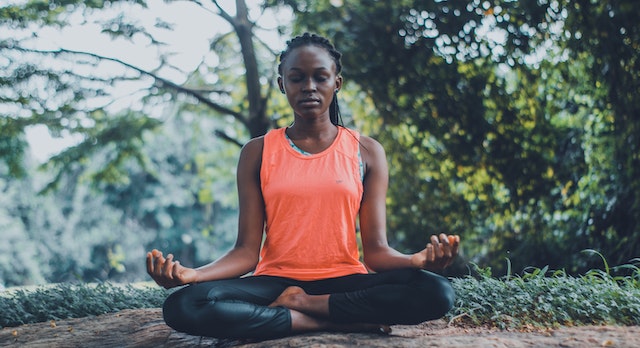When we maintain sound mental health, our emotional and psychological well-being support a positive quality of life. These factors also have a significant impact on our relationships with friends and family members.
Naturally, the inverse is also true. Poor mental health may lead to bouts of depression, self-isolation, and strained social ties. According to the Centers for Disease Control and Prevention, 20 percent of Americans will experience at least one form of mental illness in a given year. And more than half receive a diagnosis at some point in their life.
These are powerful reasons to take proactive measures to protect our emotional and psychological health. That may be why the number of Americans practicing yoga increased from 21 million in 2010 to 34.3 million in 2021. The practice is widely known for its muscular tone and flexibility benefits. But yoga also proves a transformative asset in helping ailing community members manage depression and a wide range of mental health challenges.
Understanding the Connection Between Yoga and Mental Health
Practiced for thousands of years, yoga was designed to bring the mind, body, and spirit into harmony. Although many view this concept as a spiritual pursuit, the practice has proven to reduce stress and anxiety. Researchers consistently conclude that yoga plays a pivotal, complementary role in managing a wide range of disorders.
“Several recent studies suggest that yoga may help strengthen social attachments, reduce stress and relieve anxiety, depression and insomnia. Researchers are also starting to claim some success in using yoga and yoga-based treatments to help active-duty military and veterans with post-traumatic stress disorder,” an American Psychological Association article states.

During a typical yoga session, practitioners gently flow through a series of movements and poses. Instructors emphasize steady deep breathing and traditional breathwork. Throughout the process, people maintain a mindful meditation focus that provides peaceful relaxation. The calming effects of yoga help people enter a state of reduced stress and anxiety.
Based on its mind, body, and spirit foundation, yoga is by nature a holistic approach to mental well-being. As the mental health community has become increasingly comfortable with yoga as an asset, it continues to find a place in Western medicine. It’s not uncommon for doctors and therapists to encourage struggling people to integrate yoga into their wellness regimen.
Benefits of Yoga on Mental Health
The benefits of yoga on mental health are more complex than many understand at first blush. Physical gains such as increased flexibility, pain reduction, and improved cardiovascular health have a profound influence on mental health. If you step back and consider how these perks affect a person’s daily quality of life, it stands to reason they would get an emotional and psychological boost.
The same holds true for people who pursue spiritual well-being through yoga. Those who emphasize the spiritual aspects of practicing yoga indicate they enjoy a sense of purpose, meaningfulness, understanding, and hope. Those are often issues people with depression and other disorders see as daily struggles. Yoga seems to be an elixir for the peripheral issues that undermine robust mental health.
By that same token, these are ways yoga is more commonly linked to improved mental health, according to Psychology Today.
- Reducing Anxiety: A wide variety of research studies confirm that practicing yoga decreases symptoms associated with anxiety. A study with a focus group of adolescent musicians revealed the artists felt less anxiety during performances.
- Restful Sleep: Research indicates that people with an insomnia diagnosis saw marked improvement in their sleeping patterns.
- Mood Improvement: Practicing yoga on a regular basis helps reduce depression and perceived stress. In fact, researchers followed participants of a 10-week yoga class who were incarcerated. Although an extreme focus group, prisoners reported less psychological stress.
- Reducing Post Traumatic Stress Disorder (PTSD) Symptoms: Two groups with a PTSD diagnosis were compared over a 10-week period. One took a daily yoga class, and the control group did not. More than half of those who took yoga no longer met the PTSD criteria.
The combination of focusing on the poses and deep breathing in the moment creates an environment in which people are more present. An enhanced ability to stay focused on the people and tasks at hand helps prevent the mind from wandering to negative thoughts.
Practicing Yoga for Mental Health
A variety of yoga techniques have evolved, with the oldest having Sanskrit names such as Hatha, Vinyasa, and Ashtanga. Many of today’s classes possess more general titles, such as power yoga, restorative, and flow, among others. It’s essential to select a form of yoga conducive to your physical capabilities and mental health goals.
It may be prudent to start with a Hatha class to become acclimated. Hatha is something of a catchall term and these classes cover general postures and breathwork. Often considered a type of introductory class, Hatha helps ease people into practicing yoga on a daily basis. Although experienced practitioners eventually branch out, maintaining a daily yoga regimen delivers long-term mental health results.
Additional Resources for Yoga and Mental Health
Making yoga part of a holistic mental health plan has never been more accessible. Wellness centers have opened across the country. These are usually good places to discuss a routine with a certified instructor. There are also a variety of yoga apps that can be downloaded to your phone. A yoga phone app allows you to practice at home or outdoors.
Community parks sometimes host morning or weekend yoga sessions. These have been a boon for people hoping to make friends and build a social life.
Transform Your Quality of Life with Yoga
Yoga has proven instrumental in improving mental and emotional well-being. Researchers agree it can be used as a strategic tool to reduce stress, anxiety, and manage depression. By that same token, it’s crucial to seek the support of mental health professionals if you are struggling.
